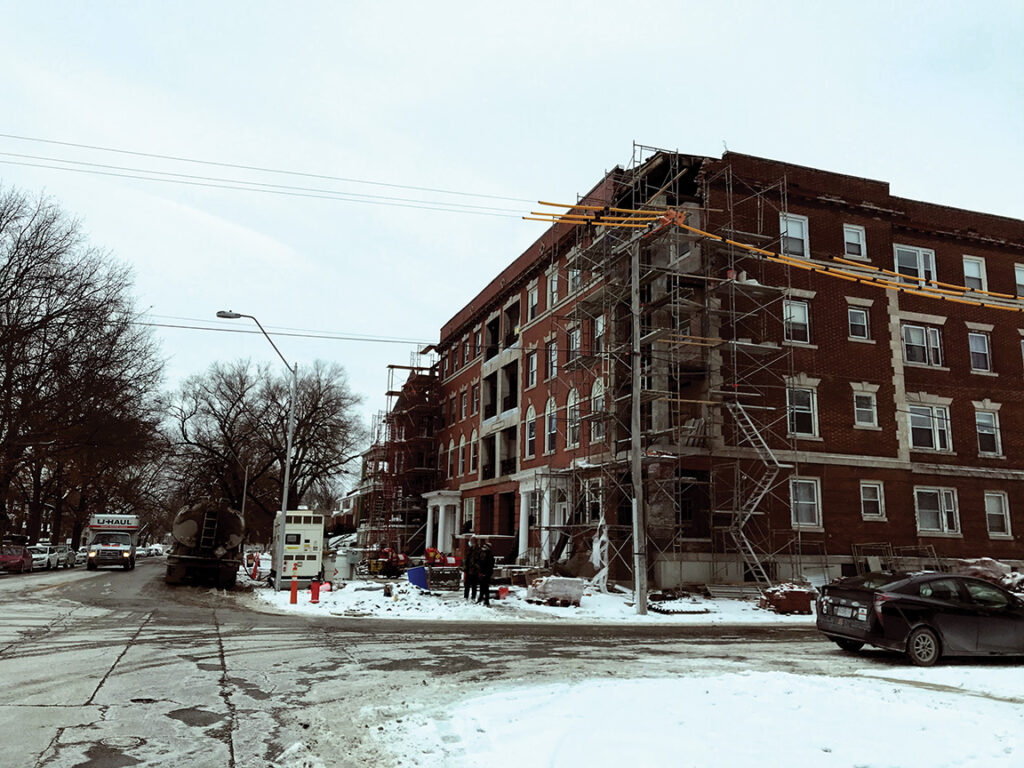
Abby Hoover
Managing Editor
Residents of more than a dozen apartments at 504 and 506 Gladstone Blvd. were left out in the cold after a fire broke out in the early morning hours of Tuesday, Feb. 9.
The contents of the apartments on the southern building were soaked, and residents scrambled to collect their essentials and find somewhere to stay, as it was unknown when they could re-enter. The sole fatality of the fire was a pet cat, but some tenants were treated on-site and at the hospital for smoke inhalation. Some units in the buildings, which are connected by the front facade and have been under prolonged construction, were not equipped with fire alarms.
Precluding the fire, at least one unit was having issues with its furnace. Tenants were asking neighbors to loan space heaters and heated blankets after the heat went out on February 8, one of the coldest days of the season.
“At about 7 a.m. Monday morning, the power went out right as a lot of people were getting ready for work, and I guess the breaker was blown or something,” said resident Jason Barnes. “Within a couple hours the power company was out here, and power was restored by 11 a.m.”
The power went out for good around 7:30 p.m. Monday. Around 9 p.m., Barnes saw utility trucks working, so he headed to bed.
“Apparently at some point in the middle of the night there was a fire in the building,” Barnes said. “We didn’t wake up at all during the fire… What worries my wife the most is that nobody knocked on our door or told us that the building was on fire, but it was dangerous and damaging enough for them to decide that all electricity needed to be disconnected to the building.”
Tenants reported a kerosene lamp started the fire in the historic building, speculating that someone was using it to stay warm, as the temperature inside the building dipped below 50 degrees. Barnes woke up around 5 a.m. Tuesday right as the fire trucks and utility trucks were pulling away.
“They all just left, and then we’re still here in the dark, it was as cold or colder than it had ever been,” he said. “No one ever told us anything.”
His unit got down to 44 degrees, and in the days following, all but one of his fish died, and his plants began to droop. At some point, the water was turned off so the pipes didn’t freeze.
“To me, that makes it uninhabitable,” Barnes said. “If it’s under 40 degrees, outside it’s zero, and there’s no water, not only can you not wash your hands or use a sink, you can’t use the toilet. You can’t take a shower, you can’t do anything.”
The Red Cross became aware of the situation and began reaching out to tenants, but no material help had been sent by the end of the week.
“I fear that there’s still some people around in some of these units that are just trying to suffer through it,” Barnes said last Wednesday. “I don’t even want to point fingers, all I know is that there’s one [group of] people that aren’t to blame, and that’s the residents of this building who were never on anybody’s mind – not the fire department, not the electric companies, not the building management. We were the last people to be told anything, if anything, our needs were never met or even asked about.”
Left with a multitude of questions and very little communication from the management company, Bowery Property Management, residents began piecing together a timeline.
Janel Morales, who has lived in the building for eight years, said the new management company took over in May 2020 when the previous owner sold to an out-of-state buyer.
“When we moved in it was an as-is basis,” Morales said. “We did the painting ourselves, we did a couple repairs ourselves, but the guy that owned it also gave us a deal on rent because of that. When this new place came in, they tried to spread their rent up to $950. We’re like, ‘Hold on a second, that’s not going to happen,’ so they came in and reassessed, but we’re still paying $150 more than we used to.”
There have been minor repairs, but no major improvements to the unit, Morales said. Later in the summer, the stone wall bordering the parking lot behind the building fell, crushing residents’ cars.
“When this building was most recently sold last year, they didn’t realize what they were getting into… they’ve been trying to renovate one apartment at a time and rent it out for about 25% more than we’re paying,” Barnes said. “It only makes sense that they would want to get us out so they can renovate that apartment and charge more.”
The iconic porches on the front of the building, which were a point of contention when the previous owner was remodeling, have been unusable for nearly four years.
Morales, who was staying on a friend’s sofa, didn’t sleep for nearly three days following the fire.
The night of the fire, she woke up again around 11 p.m. because of the cold, so she bundled up in anything she could find and tried to sleep. Around 5 a.m., she saw lights outside her window, thinking it was Evergy trucks, and not realizing it was the fire department. When the power still didn’t come back on, she checked Evergy’s website only to find no report of the outage. She made another report and tried to sleep.
“Honestly, I don’t even think I was sleeping,” Morales said. “I think it’s just so cold your body just kind of passes out, because every time I woke up like I would have a major headache and back aches just from the cold.”
When she called Evergy the final time, she was told there was some type of fire and the fire department wouldn’t allow them to turn on the electricity. She was advised to call her property management company, which she did around 9 a.m. Tuesday.
“She went, ‘Well, there was a small incident.’ She told me that at that moment, they were just waiting for clearance from the fire department so they can get the electricity back on,” Morales said.
Eventually, the property manager arrived on-site and told Morales there was a fire and they didn’t know why Evergy wouldn’t allow the undamaged side of the building to have power.
“He also said that because they won’t turn the electricity on that it was deemed unlivable at the time, and that it could be a day or two until they got things back together,” she said. “Who can afford a room for a week? How do you pick belongings or what you might need?”
Morales said the Red Cross did contact them to make sure they had somewhere to stay, and offered to open a shelter. But with her pre-existing conditions making her vulnerable to COVID-19, that wasn’t an option.
“They said that there were no smoke detectors put in on that side of the building,” Morales said of southern units. “When Bowery bought us they came and installed them because we had never had one, and actually it’s funny because the battery literally just died that night, and started beeping. I think we’re like the oldest tenants there now because when the new place took over a lot of people couldn’t afford that spike in the rent.”
Morales said in previous winters they expected a high utility bill, but hadn’t had problems with power outages.
“We feel like we’ve been living in a construction zone for the past year or two,” Morales said. “I mean, we’ve been talking about finding an alternate place to move for a while now, and I think this is the biggest sign we’ve had. They’re nice, old apartments, but if people aren’t going to keep them up then they’re not liveable.”
When Barnes returned to the building to check on his apartment, a property manager on site advised him to collect his valuable belongings, so he did, stripping family photos from the walls and covering his wife’s cherished sofa.
While management did mention to some residents that next month’s rent would be prorated for these days, no additional assistance or temporary living space was offered.
“We’re not getting responses from anybody else, so whatever help we can get, even if it is just finding a way to get our money back so we can find a way to get out of there,” Morales said on Wednesday.
By Thursday, residents had received two emails from management, saying they hoped the power would be back on that day. By that time, there were generators out front blowing warm air into the ground floor.
“The City has not marked the building condemned or dangerous at this time, and since we have made it this long and the fire was very limited, I believe the risk of them marking it as condemned is significantly less likely,” one email from Bowery read.
The Healthy Homes Rental Inspection Program received one complaint call the day before the fire, said Michelle Pekarsky, Public Information Officer for the Kansas City Health Department on Friday.
“A tenant called to complain about the heat,” Pekarsky said. “A Healthy Homes inspector responded that day and informed management the heat issue needed to be addressed. The next day, the fire occurred.”
She added that the fire department had already vacated the property following the fire, and if someone stayed there, they would be in violation of the fire department’s vacate order.
Somehow, that message got lost in all the commotion, and residents said they were never told to vacate the building indefinitely.
“My main issues with the whole sequence event is, why were we never notified that there was a fire in our building?” Barnes asked Thursday. “My other issue is, even if there are other electrical issues in this building not up to code, does that give them the right to just summarily cut off power to the entire building on one of the coldest days of the year, and for the foreseeable future? It’s been four days and the power is still off.”
He and other residents expressed their appreciation of the support and well wishes they received from the community, but are now worried about the long term solutions.
“I don’t think that anyone wants to condemn the building but it might be the easiest solution, and I think that nobody who has owned the building has really understood the level of commitment that would be needed to bring this up to code, if not just basic habitability.”
While he had no problem with the management company day to day, and even saw them making incremental progress, he feels they’re overwhelmed.
“I don’t really think they’re to blame for the fire because she wouldn’t have lit that kerosene lamp to stay warm if the electricity was on, and the electricity was off because the electric company disconnected the wires at the command of the fire marshal,” Barnes said.
The decline of historic buildings in urban core neighborhoods is nothing new to Kansas City. Barnes noted he has noticed that as soon as a house becomes vacant in Northeast, especially in the winter, he can practically count down the days until it catches fire.
“There’s so many tenants’ rights violations in this building that I don’t even know where to start,” said Tara Raghuveer, a fair housing advocate with KC Tenants.
Raghuveer heard from other tenants that they’ve overheard maintenance say they’re just waiting for this building to fall into the ground.
“This is like the fourth or fifth apartment fire like this one this season,” Raghuveer said. “It’s the landlord’s responsibility to deliver heat and water, that’s part of basic tenant rights in the state. Then it’s the health department’s responsibility to hold them accountable if they don’t do it.”
Raghuveer questioned why the health department hasn’t once used its power to suspend or revoke a landlord’s license after repeatedly violating tenants’ rights.
“The lesson that the landlords learn is they can get away with it,” Raghuveer said.
With an ongoing pandemic where the best way to stay safe is to stay home, Raghuveer called this displacement a life or death situation.
“People being able to stay at home is the way that they’re able to stay safe and keep the rest of our community safe, and tenants like these being displaced to the street is a threat, not only to the people in this building, but also our whole community, as we try to combat this virus,” Raghuveer said.
Tenants have been displaced as far as Lawrence and Sedalia, and have had to leave behind medications, lost pets and possessions, missed work and had their lives disrupted.
KC Tenants fought hard to win a tenants Bill of Rights, which was passed with strong support from City Council, in addition to the City’s Health Homes Rental Inspection Program, but Raghuveer said until there’s actual implementation and enforcement of tenants’ rights by the City, landlords are going to continue doing what they’ve done to the tenants of this property.
“What the health department needs to start doing, and the city needs to start doing is taking those complaints and violations seriously and holding landlords accountable to actually fixing the root cause of problems before there’s a catastrophe like this,” Raghuveer said.
Raghuveer said it should have never gotten to this point, and that tenants of this property or any other tenants across the city who are facing rights violations, who don’t have heat right now should call the KC tenants hotline at 816-533-5435.
“We’re getting a lot of calls across the city, not just from the tenants of this building, about landlords who have not provided adequate heat,” Raghuveer said. “That is a tenants rights violation, especially now as the temperatures are so cold and people need to be able to stay in their homes, and we will do everything in our power to make sure that these landlords are held accountable.”
On Saturday, Feb. 13, the power and water had been restored to the northern building, and the indoor temperature reached 60 degrees. Residents in the undamaged side of the building were able to return, but those on the fire damaged side of the building were still waiting to hear what the fate of their home would be.
Evergy requested customers conserve electricity in a communication sent out Sunday, Feb. 14. The request to lower thermostats, cover windows, clean furnaces, turn off unused lights and appliances, and reduce large consumers to essential processes, lasts through Wednesday, Feb. 17 as the metro continues to experience frigid temperatures.


















